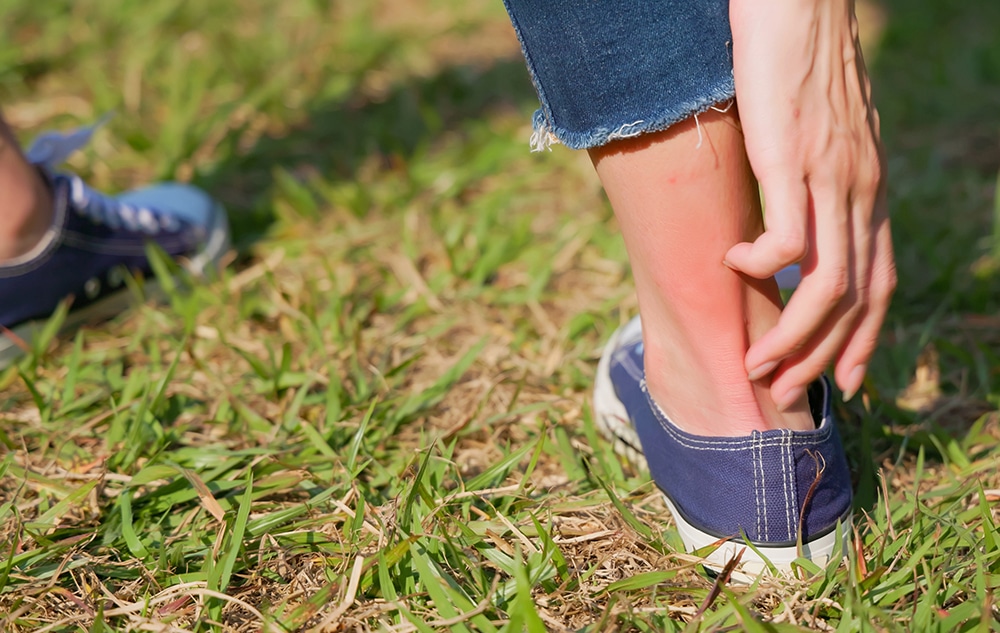Should you drain poison ivy blisters?

Poison ivy rashes can be incredibly itchy or painful—or even both. It can be highly tempting to scratch and pop the blisters for temporary relief or because you think it will help with the healing process. There are many myths about poison ivy, the rashes it causes, and the treatment of the blisters. Some are harmless but some could be harmful. Let’s talk about these myths and what you should do instead.
Poison ivy myths explained
The poison ivy plant, along with poison sumac and poison oak, contains oil that 80-90% of the American population is allergic to. Known as urushiol oil, it can be found in all parts of the plant, including its roots and leaves. Here are a few myths about the plant:
- You only need to be near the plant to get a rash - This is false. You need to touch the plant or anything with its oil to get a poison ivy rash.
- Dead poison ivy is harmless – This is also false. Urushiol can last up to five years on any surface, including dead plants.
- People immune to poison ivy are safe from it - While one can be part of the lucky 10-15% of the population resistant to it, with enough exposure and time you can develop an allergy to the plant, so it is important to remain vigilant against urushiol.
- “Leaves of Three, Let Them Be” - While this is an excellent way to avoid poison ivy, two relatives of the plant, poison sumac, and poison oak, may look different and are just as toxic as poison ivy. Our resource guide has photos of poison oak and ivy to help you identify when plants are poisonous.
What is poison ivy rash?
After 24-48 hours from the time of exposure to the plant, you will start to experience an intense itch and redness, often with blisters. The rash is caused by the urushiol oil seeping through your skin and binding to skin cells. The oil causes minimal damage to the skin cell, but causes your immune system to go haywire, attacking the cell and anything around it. This causes inflammation and itch. Here are a few additional myths about poison ivy rash:
- The rash is contagious - Only the oil from the plant is spreadable. If you wash the area thoroughly you will not infect anyone with the rash.
- The blisters contain urushiol - No, the liquid in your blisters does not contain the plant oil. Hence, the rash (when cleaned properly) is NOT contagious.
Things you should and shouldn’t do to the rash
Poison ivy rashes can be incredibly itchy and painful, and the temptation to scratch it for relief or to get rid of it is unbearable. But to get the relief you need, you will need to treat the rash properly. You should do the following things to help recover from the rash:
- Properly and gently wash the affected area with cold or warm water—never hot, as it is terrible for the skin and rash. Use Tecnu Original cleanser to effectively remove the urushiol.
- Use an anti-itch product to reduce discomfort. Special topical products like Tecnu Calagel Anti-itch Gel and Rash Relief Spray give fast relief.
- If the reaction is severe or has spread quite a bit, always consult your doctor for their assistance.
Here are the primary things that you should never do to your poison ivy rash:
- Never pop the blisters - Your body would reabsorb the liquid inside of the blister during the healing process. If popped, you would only prolong the healing process and increase the chance of infection.
- Don’t wash with hot water - The hot water might feel soothing to the rash, but it can cause further damage to the skin in its current condition. Tecnu Detox Wipes and Tecnu Original help with cleaning the poisonous oils. Tecnu Extreme can be used before or after a rash has formed.
- Don’t wrap the rash unless necessary - Your rash needs air to heal. Keep it uncovered as much as possible. If you need to go outside, wrap it loosely to prevent damage and allow air circulation.
Properly treating your poison ivy rash is key to quick and proper healing. No matter how tempting, always treat any wound with care and the right products for the job. Fortunately, Tecnu makes a variety of effective products tested in the field to help with the discomfort of poison ivy and oak reactions.




